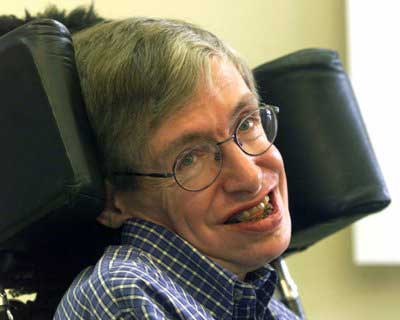 |
|
File photo of Hawking. Heaven is a fairy story for people afraid of the dark, the eminent British theoretical physicist Stephen Hawking said in an interview published on Monday. |
|
Heaven is a fairy story for people afraid of the dark, the eminent British theoretical physicist Stephen Hawking said in an interview published on Monday. Hawking, 69, was expected to die within a few years of being diagnosed with degenerative motor neurone disease at the age of 21, but became one of the world's most famous scientists with the publication of his 1988 book "A Brief History of Time." "I have lived with the prospect of an early death for the last 49 years. I'm not afraid of death, but I'm in no hurry to die. I have so much I want to do first," he told the Guardian newspaper. "I regard the brain as a computer which will stop working when its components fail. There is no heaven or afterlife for broken down computers; that is a fairy story for people afraid of the dark." When asked how we should live he said: "We should seek the greatest value of our action." Hawking gave the interview ahead of the Google Zeitgeist meeting in London where he will join speakers including British finance minister George Osborne and Nobel prize-winning economist Joseph Stiglitz. Addressing the question "Why are we here?" he will argue tiny quantum fluctuations in the very early universe sowed the seeds of human life. The former Cambridge University Lucasian Professor of Mathematics, a post once also held by Isaac Newton, has a history of drawing criticism for his comments on religion. His 2010 book "The Grand Design" provoked a backlash among religious leaders, including chief rabbi Lord Sacks, for arguing there was no need for a divine force to explain the creation of the universe. As a result of his incurable illness Hawking can only speak through a voice synthesizer and is almost completely paralyzed. He sparked serious concerns in 2009 when he was hospitalized after falling seriously ill following a lecture tour in the United States but has since returned to Cambridge University as a director of research. (Read by Renee Haines. Renee Haines is a journalist at the China Daily Website.) (Agencies)
|
英国著名理论物理学家史蒂芬•霍金在本周一刊登的一次采访中称,天堂是“为害怕黑暗的人编造的童话”。 霍金在21岁时被诊断患有退行性运动神经元病,当时预期寿命不长,但如今他已年届69岁,1988年出版《时间简史》后跻身全球最著名科学家之列。 他告诉《卫报》记者:“过去49年我一直觉得自己活不长。我不怕死,但我也不想死太早。我还有那么多要做的事情。” “我把大脑看成一个计算机,零件坏了之后就会停止工作。对坏掉的电脑来说,根本没有天堂和来世,那是给怕黑的人编的童话。” 当被问及我们应如何生活时他说:“我们应寻求自身的最大价值。” 霍金参加在伦敦举行的谷歌排行榜会议前接受了此次采访。将在此次会议上发言的还有英国财政大臣乔治•奥斯本、诺贝尔奖经济学奖获得者约瑟夫•斯蒂格利茨等人。 在回答“人类为什么会存在”这一问题时,霍金称宇宙形成初期的微小量子波动为人类的出现播下了“种子”。 霍金之前的言论屡次招致宗教界的批评。他曾担任剑桥大学卢卡斯数学教授。艾萨克•牛顿也曾担任这一职务。 他在2010年出版的《伟大的设计》一书中提出,宇宙的存在不需要上帝去解释,遭到宗教领袖的猛烈抨击,其中包括(英国犹太人教会领袖)首席拉比萨克斯勋爵。 由于身患无法治愈的疾病,霍金只能通过语音合成器讲话,而且几乎全身瘫痪。 2009年,霍金在美国巡回演讲时曾大病一场,被送往医院,引起了人们的担忧。此后他重返剑桥大学,担任研究主管。 相关阅读 (中国日报网英语点津 Julie 编辑:冯明惠) |
|
Vocabulary: afterlife: life after death or at a later time in a person's lifetime(来生,来世) backlash: a sudden and adverse reaction(强烈抵制,集体反对) |
